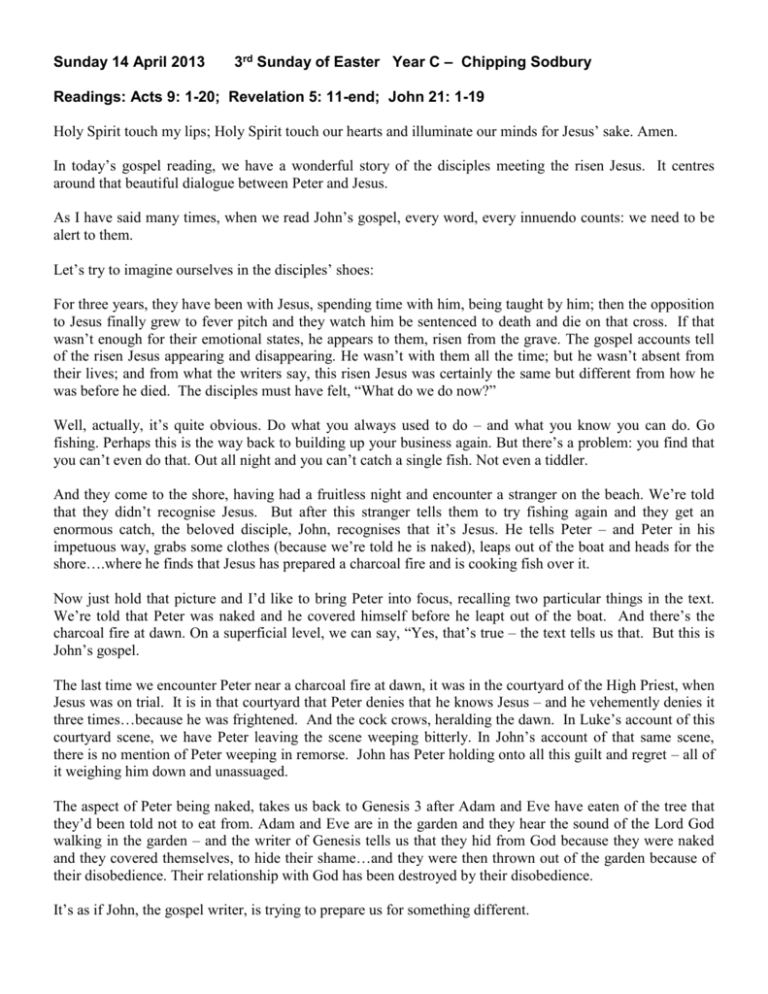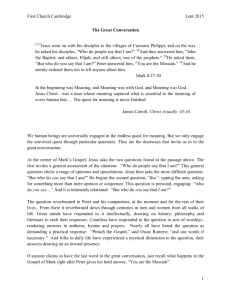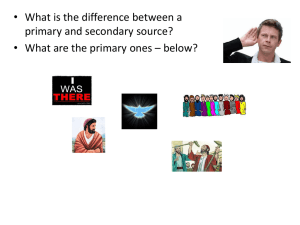Easter 3 Year C CS 2013 - The Sodbury Vale Benefice
advertisement

Sunday 14 April 2013 3rd Sunday of Easter Year C – Chipping Sodbury Readings: Acts 9: 1-20; Revelation 5: 11-end; John 21: 1-19 Holy Spirit touch my lips; Holy Spirit touch our hearts and illuminate our minds for Jesus’ sake. Amen. In today’s gospel reading, we have a wonderful story of the disciples meeting the risen Jesus. It centres around that beautiful dialogue between Peter and Jesus. As I have said many times, when we read John’s gospel, every word, every innuendo counts: we need to be alert to them. Let’s try to imagine ourselves in the disciples’ shoes: For three years, they have been with Jesus, spending time with him, being taught by him; then the opposition to Jesus finally grew to fever pitch and they watch him be sentenced to death and die on that cross. If that wasn’t enough for their emotional states, he appears to them, risen from the grave. The gospel accounts tell of the risen Jesus appearing and disappearing. He wasn’t with them all the time; but he wasn’t absent from their lives; and from what the writers say, this risen Jesus was certainly the same but different from how he was before he died. The disciples must have felt, “What do we do now?” Well, actually, it’s quite obvious. Do what you always used to do – and what you know you can do. Go fishing. Perhaps this is the way back to building up your business again. But there’s a problem: you find that you can’t even do that. Out all night and you can’t catch a single fish. Not even a tiddler. And they come to the shore, having had a fruitless night and encounter a stranger on the beach. We’re told that they didn’t recognise Jesus. But after this stranger tells them to try fishing again and they get an enormous catch, the beloved disciple, John, recognises that it’s Jesus. He tells Peter – and Peter in his impetuous way, grabs some clothes (because we’re told he is naked), leaps out of the boat and heads for the shore….where he finds that Jesus has prepared a charcoal fire and is cooking fish over it. Now just hold that picture and I’d like to bring Peter into focus, recalling two particular things in the text. We’re told that Peter was naked and he covered himself before he leapt out of the boat. And there’s the charcoal fire at dawn. On a superficial level, we can say, “Yes, that’s true – the text tells us that. But this is John’s gospel. The last time we encounter Peter near a charcoal fire at dawn, it was in the courtyard of the High Priest, when Jesus was on trial. It is in that courtyard that Peter denies that he knows Jesus – and he vehemently denies it three times…because he was frightened. And the cock crows, heralding the dawn. In Luke’s account of this courtyard scene, we have Peter leaving the scene weeping bitterly. In John’s account of that same scene, there is no mention of Peter weeping in remorse. John has Peter holding onto all this guilt and regret – all of it weighing him down and unassuaged. The aspect of Peter being naked, takes us back to Genesis 3 after Adam and Eve have eaten of the tree that they’d been told not to eat from. Adam and Eve are in the garden and they hear the sound of the Lord God walking in the garden – and the writer of Genesis tells us that they hid from God because they were naked and they covered themselves, to hide their shame…and they were then thrown out of the garden because of their disobedience. Their relationship with God has been destroyed by their disobedience. It’s as if John, the gospel writer, is trying to prepare us for something different. There is a charcoal fire at dawn, but this time the conversation is going to be different. There is a new dawn waiting. Yes, Peter was naked and he covered himself up, to hide his shame and guilt and all the other terrible feelings that are plaguing him. Peter comes to Jesus with all that unresolved tension arising from his denial, with all the shame, with all the forboding. Will he too be banished? But this time, there is not going to be a rejection. Jesus offers the disciples something to eat. The scene has echoes of the eucharist. The disciples need to be fed by Jesus. Then Jesus takes Peter aside – try to picture it: they’re probably walking along the edge of the shore, away from the others. And the elephant in the room – Peter’s guilt, shame – the list is very long – is confronted in an oblique way. Jesus asks Peter three times, “Simon, son of John, do you love me more than these?” “Simon, son of John, do you love me?” “Simon, son of John, do you love me?” Peter is bewildered. The Greek varies the words which we translate for “love”. As Michael Perham says in his book that we have been studying during Lent, Peter replies to Jesus the first two times by saying, “Yes, Lord, you know that I’m your friend.” And the third time, Jesus asks (to meet Peter where he is), “Simon, son of John, are you my friend?” And Michael Perham reminds us of Gregory of Nyssa’s saying: the one thing truly worthwhile is becoming God’s friend.” Peter denied Jesus three times. Jesus asks Peter three times if he is Peter’s friend – to which Peter says “Yes”. Jesus doesn’t leave it there, though. He gives Peter work to do – he entrusts Peter with some vital work – of feeding his lambs, tending his sheep, feeding his sheep. Much earlier, Jesus had told Peter that he would be the rock on which Jesus would build his church. That task is still Peter’s. This beautiful account gives us hope. All of us have carried burdens of guilt, regret, shame. Many of us may still carry such burdens and feel totally unworthy of God’s love and acceptance. But this gospel passage today tells us that there truly is a wideness in God’s mercy – not one of us has strayed so far from God that we’re unforgivable. And following on from that – just because we have done what we might feel is unforgivable – (which it isn’t) – God doesn’t then write us off. He calls us to a new beginning; he calls us anew to what he was already calling us to; he calls us to be new creations, filled with his spirit; he calls us to know just how much he loves each one of us even though we fall away from him. Forgiveness and vocation go together. And our journey from shame to forgiveness reminds us that we’re on a journey from self-confidence towards child-like dependence upon God. Take that question of Jesus’ to Peter and apply it to yourself: N son/daughter of N, do you love me? N, son/daughter of N, are you my friend? Know that Jesus wants you to be his friend. Remember Gregory of Nyssa’s words: the one thing truly worthwhile is becoming God’s friend.” Know that Jesus wants to forgive you. Know that in Jesus, you are made a new creation and Jesus calls you to be the person God has created you to be.








